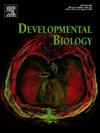lmod2a mutations affect F-actin and SRF pathway leading to cardiac dysfunction in zebrafish
IF 2.1
3区 生物学
Q2 DEVELOPMENTAL BIOLOGY
引用次数: 0
Abstract
Leiomodin 2 (LMOD2), a critical pathogenic gene associated with human dilated cardiomyopathy (DCM), is essential in regulating thin filament length during cardiac development. This study generated a homozygous knockout zebrafish line (lmod2a−/−) using CRISPR/Cas9 genome editing. lmod2a−/− embryos exhibited impaired locomotor activity alongside irregular heart rhythms, reduced cardiac output, compromised contractility, and delayed calcium transients, as revealed by high-speed imaging and calcium optical mapping. Immunofluorescence staining demonstrated a marked reduction in filamentous actin (F-actin), corroborated by QPCR data showing downregulation of the F-actin marker gene acta1b. Moreover, expression levels of key downstream targets of the serum response factor (SRF) signaling pathway were markedly reduced in mutants. These findings indicate that lmod2a deficiency disrupts F-actin homeostasis and SRF-mediated gene regulation, ultimately leading to defective cardiac performance. This study establishes a novel zebrafish model for investigating LMOD-associated cardiomyopathies and provides valuable insights for future therapeutic interventions targeting actin-related cardiac disorders.
lmod2a突变影响斑马鱼f -肌动蛋白和SRF通路导致心功能障碍。
leomodin 2 (LMOD2)是一种与人类扩张型心肌病(DCM)相关的关键致病基因,在心脏发育过程中调节细纤维长度至关重要。本研究利用CRISPR/Cas9基因组编辑技术生成了纯合子敲除斑马鱼品系(lmod2a-/-)。高速成像和钙光学成像显示,Lmod2a -/-胚胎表现出运动活动受损、心律不规则、心输出量减少、收缩力受损和钙瞬态延迟。免疫荧光染色显示丝状肌动蛋白(F-actin)明显减少,QPCR数据证实了F-actin标记基因acta1b的下调。此外,在突变体中,血清反应因子(SRF)信号通路的关键下游靶点的表达水平显著降低。这些发现表明,lmod2a缺乏会破坏f -肌动蛋白稳态和srf介导的基因调控,最终导致心脏功能缺陷。本研究建立了一种新的斑马鱼模型来研究lmod相关的心肌病,并为未来针对肌动蛋白相关心脏疾病的治疗干预提供了有价值的见解。
本文章由计算机程序翻译,如有差异,请以英文原文为准。
求助全文
约1分钟内获得全文
求助全文
来源期刊

Developmental biology
生物-发育生物学
CiteScore
5.30
自引率
3.70%
发文量
182
审稿时长
1.5 months
期刊介绍:
Developmental Biology (DB) publishes original research on mechanisms of development, differentiation, and growth in animals and plants at the molecular, cellular, genetic and evolutionary levels. Areas of particular emphasis include transcriptional control mechanisms, embryonic patterning, cell-cell interactions, growth factors and signal transduction, and regulatory hierarchies in developing plants and animals.
 求助内容:
求助内容: 应助结果提醒方式:
应助结果提醒方式:


